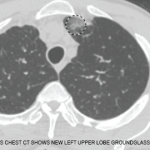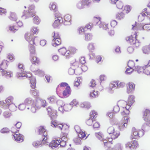10. Dupilumab for Relapsing or Refractory EGPA
Abstract 0856: Molina et al.16
The cytokines IL-4 and IL-13 are responsible for mediating the allergic response in a wide range of diseases. IL-4 influences Th2 cell development and antigen-specific IgE responses. IL-13 induces IgE secretion from activated B cells. Dupilumab is a humanized monoclonal antibody that inhibits both IL-4 and IL-13 signaling by binding the IL-4 receptor alpha chain. Dupilumab has been approved by the FDA for the treatment of atopic dermatitis, asthma, eosinophilic esophagitis and prurigo nodularis.
This retrospective study included 50 patients with EGPA who were treated with dupilumab, most commonly for debilitating otolaryngologic manifestations, glucocorticoid dependency or poorly controlled asthma. Of the 50 patients in this study, 33 (66%) had a complete or partial response to dupilumab, which was associated with a reduction in the average daily dose of prednisone from 7 mg to 2.5 mg at 12 months.
Dupilumab-induced eosinophilia was reported in 33 patients (66%), but remained asymptomatic in 42% of cases. Disease flare was reported in 15 patients (30%) and occurred in association with blood eosinophilia in 87% of cases. Most adverse events were mild to moderate (including headache, injection site reactions, myalgias and arthralgias), but two patients experienced non-fatal anaphylactic shock.
Clinically, dupilumab is effective for eosinophilic chronic rhinosinusitis and nasal polyposis, which can be particularly problematic for patients with EGPA. However, clinicians have tended to avoid dupilumab in patients with EGPA due to a concern that dupilumab-induced hypereosinophilia could precipitate a disease flare. This study confirms both trains of thought: Dupiliumab may be an effective therapy for EGPA, but patients need to be monitored carefully for disease flare.
Dupilumab-induced hypereosinophilia tends to dissipate with time, and it will be interesting to see if future studies demonstrate that the associated risk of disease flare dissipates with prolonged therapy. Alternatively, simultaneous treatment with an IL-5 inhibitor may mitigate the risks associated with this drug for patients with underlying hypereosinophilic syndromes.
Philip Seo, MD, MHS, is an associate professor of medicine at Johns Hopkins University School of Medicine. He served as the third physician editor of The Rheumatologist.
References
- Nagle S, Nguyen Y, Puéchal X, et al. Real-life use of the PEXIVAS reduced-dose glucocorticoid regimen in granulomatosis with polyangiitis and microscopic polyangiitis [abstract]. Arthritis Rheumatol. 2023;75(suppl 9).
- Walsh M, Merkel PA, Chen-Au Peh C-A, et al. Plasma exchange and glucocorticoids in severe ANCA-associated vasculitis. N Engl J Med. 2020 Feb 13;382:622–631.
- Mendel A, Behlouli H, Vinet E, et al. Effect of trimethoprim sulfamethoxazole prophylaxis on infections during treatment of granulomatosis with polyangiitis with rituximab: A population-based study [abstract]. Arthritis Rheumatol. 2023;75(suppl 9).
- Specks U, Jayne D, Merkel P. Report on twelve patients with diffuse alveolar hemorrhage in the phase 3 trial of avacopan for the treatment of ANCA-associated vasculitis [abstract]. Arthritis Rheumatol. 2023;75(suppl 9).
- Jayne DRW, Merkel PA Schall TJ, et al.; the ADVOCATE Study Group. Avacopan for the treatment of ANCA-associated vasculitis. N Engl J Med. 2021 Feb 18;384:599–609.
- Lee Y, Song H, Seo W, et al. Relapse of patients with ANCA-associated vasculitis who are on dialysis [abstract]. Arthritis Rheumatol. 2023;75(suppl 9).
- Roccatello D, Sciascia S, Foddai S, et al. Treating patients with ANCA-associated vasculitis and very severe renal injury with an intensified B cell depletion therapy: Comparison with a control cohort receiving a conventional therapy [abstract]. Arthritis Rheumatol. 2023;75(suppl 9).
- Condon MB, Ashby D, Pepper RJ, et al. Prospective observational single-centre cohort study to evaluate the effectiveness of treating lupus nephritis with rituximab and mycophenolate mofetil but no oral steroids. Ann Rheum Dis. 2013;72:1280–1286.
- Idoate J, Mourguet M, David R, et al. Impact of ANCA specificity on risk of major adverse cardiovascular events in ANCA-associated vasculitis [abstract]. Arthritis Rheumatol. 2023;75(suppl 9).
- Fukui S, Matsuo H, Kojima K, et al. Clinical characteristics of ANCA-associated vasculitis with high levels of serum Interleukin 7 [abstract]. Arthritis Rheumatol. 2023;75(suppl 9).
- Wechsler M, Nair P, Terrier B, et al. Efficacy and safety of benralizumab compared with mepolizumab in the treatment of eosinophilic granulomatosis with polyangiitis in patients receiving standard of care therapy: Phase 3 MANDARA study [abstract]. Arthritis Rheumatol. 2023;75(suppl 9).
- Cottu A, Groh M, Desaintjean C, et al. Benralizumab in eosinophilic granulomatosis with polyangiitis [abstract]. Arthritis Rheumatol. 2023;75(suppl 9).
- Dutertre M, Pugnet G, De Moreuil C, et al. Long-term efficacy of remission-induction regimens for eosinophilic granulomatosis with polyangiitis [abstract]. Arthritis Rheumatol. 2023;75(suppl 9).
- Chung SA, Langford CA, Maz M, et al. 2021 American College of Rheumatology/Vasculitis Foundation Guideline for the Management of Antineutrophil Cytoplasmic Antibody-Associated Vasculitis. Arthritis Rheumatol. 2021 Aug;73(8):1366–1383.
- Terrier B, Pugnet G, de Moreuil C, et al. Rituximab versus conventional therapeutic strategy for remission induction in eosinophilic granulomatosis with polyangiitis: A double-blind, randomized, controlled trial [abstract]. Arthritis Rheumatol. 2021;73(suppl 9).
- Molina B, Padoan R, Urban M, et al. Dupilumab for relapsing or refractory eosinophilic granulomatosis with polyangiitis: A European retrospective study [abstract]. Arthritis Rheumatol. 2023;75(suppl 9).



